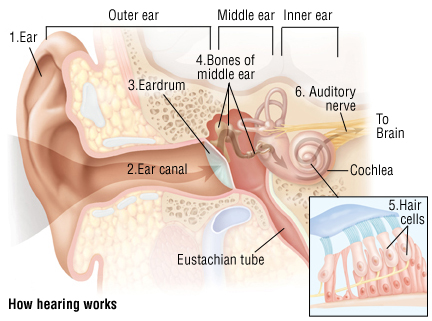Saturday was World Hearing Day, so I showed a few shots of my Bionic Ear on instagram. Some people were shocked to see I had one! So I decided it was time to do a little updated series here about why I have one, how I got it, how I like it, and what life is like with one.
I was born with normal hearing.
Actually, I was born with really great hearing. My mom used to get irritated because I'd hear her whispering things to dad in the next room and yell, hey, I want to hear about that!
As a singer, and a musician, your hearing is important. Obviously. A lot of my voice lessons involved listening. Intervals, pitch-matching, etc; all of that is a huge part of the musical art.
In college, people started to notice that I wasn't hearing them when they were talking to me. Now, some of that was just that I tend to get really absorbed in things--a book, something I'm writing. But people would call my name, and I wouldn't answer.
I went to the audiologist at Nationwide Children's, and I did have some hearing loss. Not a lot, and probably not enough for hearing aids to help. But it was showing up on the hearing tests. OK. I just shrugged and went on with my life.
In between 2003-2005 (pre-transplant), I was on a lot of drugs. Hard core, IV meds, in order to keep me alive and breathing. Some of these were ototoxic--meaning they killed the hair cells in my ears, the hairs that conduct sound to the cochlea. Without these hair cells, you don't hear.
(Here's a brief explanation:
When you are exposed to loud music or noise, it is your hair cells which are damaged. Hearing loss occurs because loud sounds are really just large pressure waves (like when you stand next to a subwoofer and can "feel" the bass). These large pressure waves bend the stereocilia too far, sometimes to the point where they are damaged. This kills the hair cell. Since cochlear hair cells can not grow back, this manifests as a permanent hearing loss.)
In my case, it wasn't loud noises. It was the medication. Once hair cells are gone, they do not grow back. They are gone forever.
And the more I used these drugs, the more hair cells died, in both ears.
By the time of my transplant, my hearing had gotten worse, and we were starting to think about hearing aids. I was fitted with my first pair soon after transplant. Hearing aids are not covered by insurance. I needed the most powerful kind, the behind-the-ear hearing aids, and they were fit to my ear shape.
They were also a pain in the butt.
Hearing aids just magnify sound. It's like turning up the volume on everything. But it's everything. It's not discriminate. Things like pages turning were incredibly loud. In a crowded room, I couldn't focus on one sound. Everything came in, all the time.
The other problem is that hearing aids break. The outer ear part would separate from the part that went in my ear. I was constantly trying to put them back together with tape!
In 2007-2008, I got sick again--and more ototoxic meds. Now the hearing aids weren't really helping at all. It was time to think about cochlear implants.
I didn't like this idea. One, I didn't like the idea of a magnet in my head. I didn't like that it would take any residual hearing away from the ear that had the CI. I didn't like the idea of surgery and weirdness.
But eventually it got to the point where it hurt to hear. The organ at church was painful. Listening to people was awful. I didn't like to go to crowded places. I couldn't go to the movies, and I love the movies.
That's when we decided it was time for a CI.
A cochlear implant is vastly different than a hearing aid. A hearing aid, as I said above, just amplifies sound. A CI helps my brain decipher and understand the sound. It directly stimulates the auditory nerve, so they bypass all my damaged equipment and go right to the source.
I had to have some tests done: you can't have a CI unless you have a certain amount of hearing loss. You need to have moderate to profound loss to qualify for it. Insurance does pay for a CI and the surgery.* I had a CT scan and MRI** on my head, to make sure they could implant the magnet, as well as more hearing tests, to determine the extent of my hearing loss, and also, which ear would receive the implant (I didn't get bilateral CIs. More on that next.). My right ear has slightly more hearing than the left, so the left ear was the "winner", and has the CI.
Surgery was scheduled for May of 2008.
In the next installment, I'll talk about surgery, recovery, and how the CI works.
* More about insurance coverage in the upcoming installments.
**Last MRI ever, because, with a magnet in my head, they're contraindicated from here on out. Yay!

